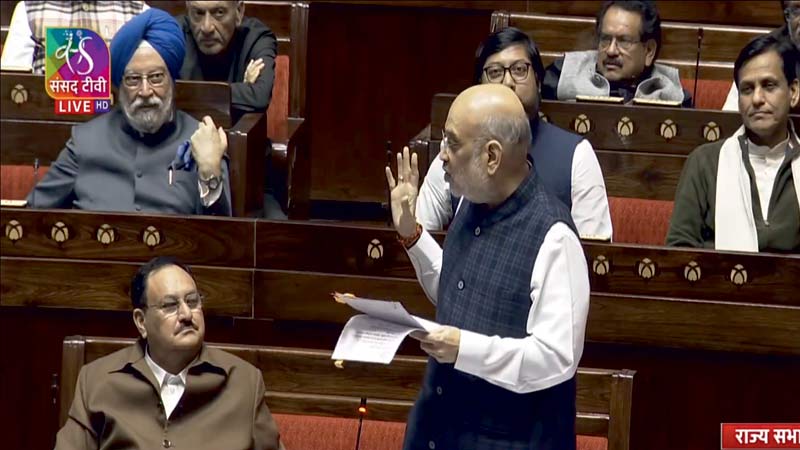Union HOME Minister’s response on Criminal Law Bills
In response to the discussions on the Criminal Law bills, Union Minister of Home Affairs Shri Amit Shah conveyed that the Bharatiya Nyaya Sanhita (BNS) provides a precise delineation of terrorism, eliminates sedition as an offence, and introduces a novel section on “offences against the state”
The Union Minister emphasised that the three bills underwent comprehensive consultations, and he scrutinised every detail, including commas and full stops, in the draft legislation before presenting them for approval in the House.
–He underscored the removal of sedition in the new law, articulating, “We have replaced an individual with the country. Rajdroha (sedition or offence against the Raj, i.e., Britsh Raj) has been replaced with Deshdroha (offence against the nation or
He asserted that speaking against the nation’s interests, damaging the flag, or harming the country’s property could lead to imprisonment
country).” He observed that notable figures like Gandhi, Tilak, and Patel faced imprisonment under this British law, yet it remained unrevoked by the Opposition during their tenure.
–In response to concerns raised by Shri Asaduddin Owaisi (AIMIM, Hyderabad, Telangana), the Union Home Minister clarified that citizens in this country would not be imprisoned for criticising the Government. However, he asserted that speaking against the nation’s interests, damaging the flag, or harming the country’s property could lead to imprisonment.
–He also highlighted that the existing criminal laws, i.e., the Indian Penal Code (IPC), Indian Evidence Act, and the Code of Criminal Procedure (CrPC), reflect a colonial mindset focused on punishment rather than justice. He pointed out that the laws from the colonial era prioritised offences such as “looting the treasury,” “uprooting rail tracks,” and “insult to the Crown” over matters related to crimes against women and children, human rights, border security, and the army.
–The previous laws categorised rape under Section 375-376 and murder under Section 302, but the new bill redefines these offences, placing Rape under Section 63 and murder under Section 101. Similarly, kidnapping, formerly under Section 359, is now addressed under Section 136. By highlighting this, he stated that the Modi Government has consistently prioritised the well-being of women and citizens.
–The Union Minister informed the house that the three laws were framed on the principles of justice, transparency, and fairness. He highlighted the Government’s commitment to fulfilling manifesto promises, citing the revocation of Article 370, the reduction of AFSPA in 70 percent of northeastern areas, the prohibition of triple talaq, and the implementation of a 33 percent reservation for women in Parliament as noteworthy achievements.


